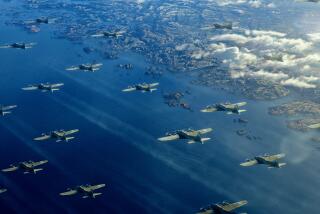U.S. Airborne Troops Carve Out Forward Base : Ground war: Screaming Eagles drive fast and deep into Iraq at outset of attack. They set up a vital refueling point for choppers.
- Share via
WITH U.S. FORCES IN IRAQ — Eight hours and more than 50 miles into Iraq, an advance ground-and-air team of the 101st Airborne Division was setting up camp and pumping gas by lunchtime on the day the ground war started.
And they were looking still further into Iraq for an enemy on the run.
“It’s not for Kuwait any more--it’s personal,” said Specialist Jamie Byman, 25, of Somerset, Pa. “He (Iraqi President Saddam Hussein) kept us here six months from our families.”
The 101st, backed by elements of the 18th Aviation Brigade, drove quickly and without significant resistance toward its objective, moving off the left flank of Kuwait.
A-10 attack planes and Apache helicopter gunships raked suspected Iraqi positions just before dawn. But by late morning on Sunday, only the crackle of a sky full of friendly helicopters and a hurry-up of soldiers acting out for real what they had practiced so long told of the opening hours of the great ground war in this battle sector.
Given the point of attack and intensity of preparatory bombing, soldiers were not wholly surprised at the lack of resistance.
“Our master outfit, the LURPS (long-range reconnaissance patrol) called when we were five minutes out and told us, ‘No enemy on the 62 (landing zone),’ ” said Specialist Thomas Reed, 21, 101st Airborne Division Pathfinder from Boston. The opening day’s operation was to move the helicopter-mobile division and other coalition forces to a forward attack point. That meant ferrying troops and a massive cargo of supplies across the Iraqi border from Saudi Arabia to a desolate, crater-like depression, blown by wind and sand--a forlorn place that would attract only men with such a single-minded job as war.
As the 101st’s “Screaming Eagles” secured a perimeter, the 18th Aviation Brigade brought in entire gas stations--complete with gas--that were set up and pumping in 15 minutes, refueling the helicopters that give the 101st its mobility and its stinging firepower.
After the long wait, the actual invasion brought a rise of hot blood from the troops leading the push into Hussein’s Iraq.
“This is not only for the liberation of Kuwait--it’s for the liberation of me from my situation,” said Specialist Keith Doty of Houston.
From the stillness of pre-dawn, when only traces of Iraqi garbage and their tracks through road ruts could be seen, the 101st forward operations base took on the look of an established military outpost within hours.
Five and six helicopters at a time were refueling at each of three forward arming and refueling points, turning the Iraqi desert into giant clouds of dust that filled the sky for miles. Ground troops dug in with earnest.
“Guys came back from Vietnam and didn’t get the respect they deserved,” said a smiling Specialist Darrell Jeffries of Kansas City, Mo. “This one’s for them. I hope Saddam is ready for us. We’re ready for him.”
For one group of soldiers, the mission to build the forward base began before dawn at the briefing room of A Company 2/159th Aviation Regiment-Helicopter Lift Squadron in support of the 1st Brigade of the 101st Airborne Division (Air Assault).
Artillery rumbled in the distance. The pilots plotted their routes and last-minute radio frequencies for a mission six weeks in the planning. The session broke and each man had a message for the other: “See you tonight.”
“I want to see everyone tonight!” said Maj. Clint Palmer, who commanded a company of helicopters.
With the morning still in blackness, the men and a few women walked behind red-filtered flashlights to their twin-rotor CH-47 Chinook medium-lift choppers. They began their cockpit checks and listened to President Bush’s live address to the nation, carried by the BBC and picked on their chopper radios.
“Tingles down the spine,” said Capt. Kurt Fedors of Gilman, Wis., the pilot of one ship.
Other soldiers wiped away tears in the remaining shadow of dawn, the result of the President’s brief speech and the relief that came knowing the final fight had begun at last.
Fedors made it unanimous among Army troops on the front lines. It was high time.
“Everything that can be planned has been planned; now it’s the unknown,” Fedors said.
Clouds of dust formed on the horizon as the infantry pulled out. Fedors spoke of his marriage, which is six months old; five of those months he has spent here. “The letters I get are encouraging,” he says.
Pilots played cards and wondered what it will be like to go home where they can go to the toilet alone without having to wear a helmet--little things they didn’t even know were pleasures.
Then, like a bolt, it comes. A hand arcs a circle in the air, and the droopy rotor blades turn, slowly at first, then with powerful determination. Huge loads of fuel in rubber bladders, ammunition in crates and other war essentials are slung beneath the helicopters. They lift and turn due north at 50 feet above the ground and at 100 knots.
The land is so flat that it rarely sees a shadow, even in early morning. Evidence of the Iraqis is scant--a trailer, two destroyed armored vehicles, oil drums and endless tire and tread trails through the desert.
Along the way, soldiers ask themselves why: Why them? Why now? Didn’t they join for help in getting a college education?
Maj. Ed Parrish, an airborne ranger accompanying a supply helicopter into the landing zone, finds an answer in Shakespeare.
“Let me paraphrase Henry V,” Parrish said. “Those who are home in bed the day will hold their manhood cheap.”
This report was reviewed by military censors.
More to Read
Sign up for Essential California
The most important California stories and recommendations in your inbox every morning.
You may occasionally receive promotional content from the Los Angeles Times.










